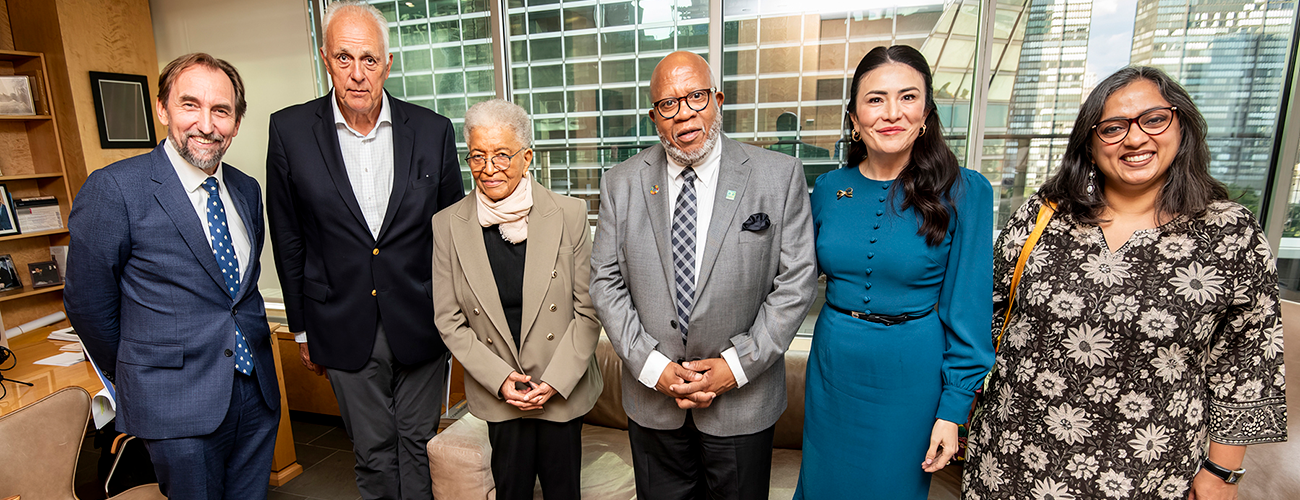Panelists for a high-level policy forum cohosted by IPI and the Open Society Foundations (OSF) on September 12th assessed the current health of the multilateral system and outlined strategies to strengthen multilateralism as a whole in a timely conversation ahead of the 78th Session of the General Assembly. In a bid for hope, they highlighted opportunities to bolster collective efforts and collaboration within the international community in the face of the converging and increasingly complex challenges of our time. The discussion was anchored in the principle of inclusion as speakers offered their recommendations for meaningful reform, gender equity, empowering states of all sizes, and building innovative alliances across nations, civil society, and the private sector.
IPI has been involved in the central debates of the multilateral system for many years, and this event provided the latest intervention on the evolving state of multilateralism with an updated question: Is the multilateral system on the verge of collapse? To shed light on both pressure points and areas for growth alike, the policy forum was framed by empirical data in the findings of the Multilateralism Index, produced in 2022 by IPI and the Institute for Economics and Peace (IEP), and drew on the results of a new global poll by OSF conducted in May and July of this year. The poll, “Open Society Barometer: Can Democracy Deliver?” surveyed more than 36,000 respondents from 30 countries representing the views of more than 5.5. billion people on global solidarity, democracy, human rights, financing for climate change and debt, and international governance.
President of the 78th Session of the General Assembly, H.E. Dennis Francis, set the tone for what will be required of all global decision makers for a cohesive multilateral system built for the advancement of all people. He delivered a call to lead by example and a pledge of transparency from the very top of the UN-based system. He highlighted three key strategies: restore trust by “vehemently denouncing behavior that violates the cherished tenets of the UN Charter;” reassess meaningful and complementary engagement in the international system; and insist on inclusion through the empowerment and involvement of all populations.
Addressing the speed and complexity of modern challenges will require agile solutions that recognize our interdependence and are willing to think imaginatively about future partnerships and alliances that break from the existing international architecture. For this task, Former President of Liberia and Nobel Peace Laureate H.E. Ellen Johnson Sirleaf emphasized the need to “prioritize the most vulnerable, marginalized populations,” in the decision-making processes that most affect them as those “who bear the brunt of interconnected challenges.” She noted the particular significance of women’s participation as key for development and sustainable peace and an essential piece of the multilateral puzzle.
As a representative of states facing existential challenges, Permanent Representative of Costa Rica to the UN Maritza Chan, reminded the audience of the pivotal role that small states can play if we provide them with the necessary resources and expertise on emergent technologies and dare to unlock their potential to address global problems in areas where they may already be leading the charge, such as AI advancement. Meghna Abraham, Executive Director of the Center for Economic and Social Rights, provided a voice for the civil society sector on the panel. She advocated for civil society as the model to follow in going beyond proscriptive silos and fostering innovative responses. Abraham firmly asserted the presence of numerous opportunities for reform but noted the contingency of those opportunities for change on “a shift in power and a shift in resources.” Underpinning panelists’ talking points, was the sentiment that in order to change the system so that it will actually work for people, enable them to survive, and have ownership in the multilateral process, we will need mobilization across disciplines and attention to the many contradictions of the very system designed to protect them.
Opening Remarks:
H.E. Dennis Francis, President of the 78th Session of the General Assembly
Speakers:
Lord Mark Malloch-Brown, President, Open Society Foundations
H.E. Ellen Johnson Sirleaf, Former President of Liberia, Nobel Peace Laureate, Former Chair of ECOWAS, Founder of the Ellen Johnson Presidential Center for Women and Development, Former Co-Chair of the Independent Panel for Pandemic Preparedness and Response, and Co-Chair of the UN Secretary-General’s High-Level Advisory Board on Effective Multilateralism (HLAB)
H.E. Maritza Chan, Permanent Representative of Costa Rica to the United Nations
Meghna Abraham, Executive Director of the Center for Economic and Social Rights
Moderator:
Zeid Ra’ad Al Hussein, President and CEO, International Peace Institute








